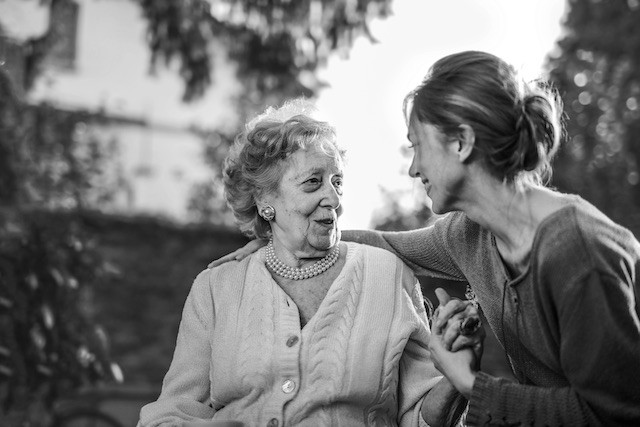Companion care can vary greatly from person to person and is carefully tailored to each individual’s specific needs and goals. At its core, companion care is physical and emotional support for an adult, whether that person is elderly, ill, disabled, or has other unique special needs. This will look different for every person; it typically includes social support and general assistance with daily living activities. Please note that in-home companion care is separate from medical care. While caregivers can help clients take their medications, accompany them to their doctor appointments, relay important messages and information that the doctor has shared, do memory exercises, and stay active, they are not medical professionals and cannot treat or diagnose medical conditions. Please note that we do place certified nursing assistants (CNA), home health aides (HHA) and Registered Nurses (RN); please visit this page for additional information on those services. If you are looking for a caregiver job opportunity, please visit our job board. Contact us now to learn more about the process of finding companion care. Companion care can have a myriad of benefits. Firstly, there is the physical day-to-day support a companion can offer – this can include checking the mail, running errands, assisting with exercise routines, making sure things stay organized in the home, accompanying the elderly to their doctor appointments and relaying important information that the doctor has shared. Taking these small tasks off your elderly loved one’s to-do list can greatly ease anxiety and stress, while making sure the household runs smoothly. Beyond the physical support, a companion can offer invaluable social interaction and care. Companions can help their clients with hobbies, accompany them to museums, and other social gatherings, as well as just have compassionate and thoughtful conversations. Loneliness is a huge problem for the elderly and those with limited mobility who live alone; companion care can help to ease this problem and drastically improve quality of life.
There are a few ways to approach home care services, depending on the needs of the client. Clients can choose between live-in or live-out care. A live-out companion, whether full-time or part-time, might spend hours with the client several days a week; they will chat with the client, check on their well-being, assist with hobbies and errands, and accompany them to any events or appointments. Live-in care is better for those who need more full-spectrum support, have sleep issues, or who might need other assistance during the night. We absolutely recommend using an agency to find companion care, whether for yourself or a loved one. You do not need to use an agency specializing in companionship services; BAHS has a wide roster of companions on our roster, both in the US and abroad, and can help you find the right match for true peace of mind. Learn more about our standards. An agency can relieve a lot of the uncertainty – background checks, references etc. – and allows you to focus on finding the person that is the best match. For elderly care and companion roles in particular, personality match between the companion and client is critical as so much of the job is close social interaction.
Just as with all our candidates, we carefully screen every companion candidate on our roster. This means our team has interviewed them, checked references, confirmed past employment, and, at client request, done a full and comprehensive background check. Our companions have a range of backgrounds and experience, from senior care to special needs, and more. The short answer is anyone who could benefit from regular in-home social interaction and assistance with day-to-day activities. This is often elderly people, disabled people, or those with special needs. Our caregivers are patient, compassionate, and deeply care about their clients. It is important to note that companion care is different than – and not a replacement for – a nursing assistant or any type of medical care. Companions primarily focus on non-medical companionship and assistance with daily tasks, whereas CNAs have a more medical-focused role and have received specialized training and certifications. You can learn more about CNAs here. If you are unsure which is better for your loved one, we recommend having a discussion with their healthcare team. Caregiver services vary based on the demands of the role, the cost of living in your city, and each candidate’s unique experience. If you’re seeking companion care, please contact BAHS for current salary expectations in your area.
SERVICES
Companion Care Services

What is companion care?
What are the benefits of companion care?



How does companion care work?
Should I use an agency to find companion care?


Companion Home Care FAQ
How do you screen caregivers?
Who might need companion care?
What is the difference between a companion and a Certified Nursing Assistant (CNA)?
How much does companion care cost?


